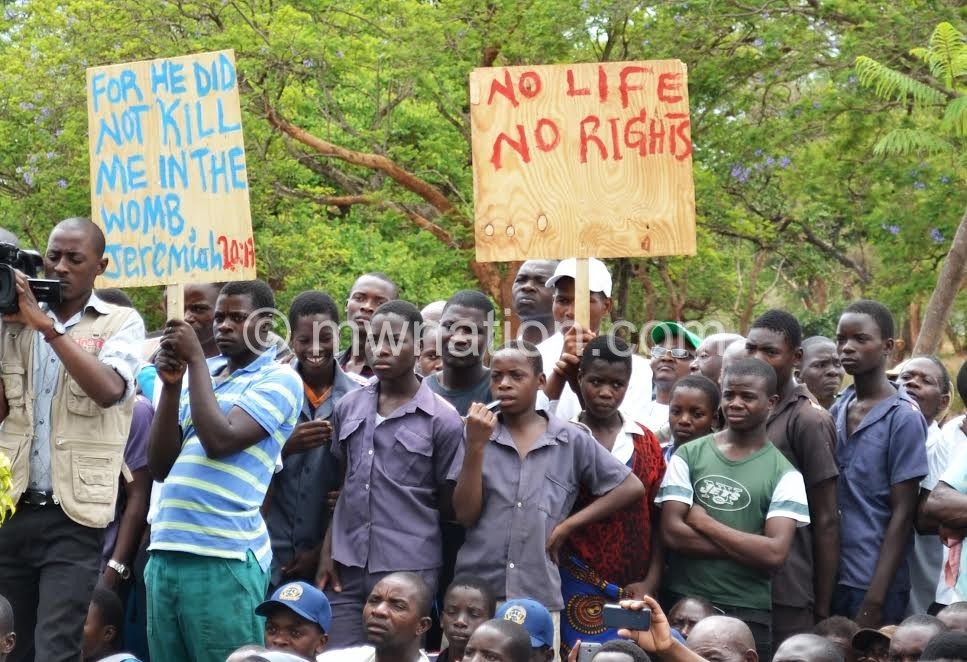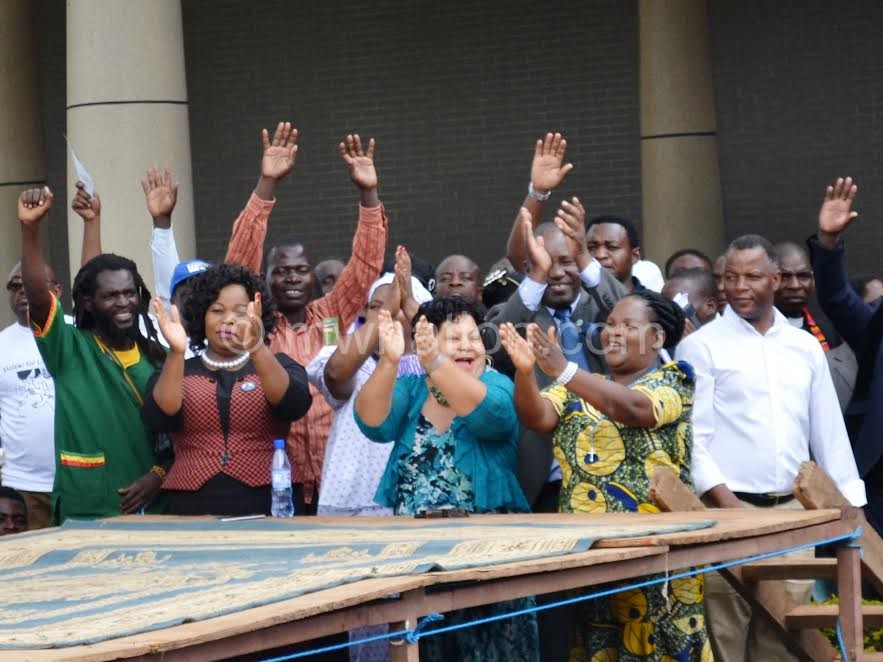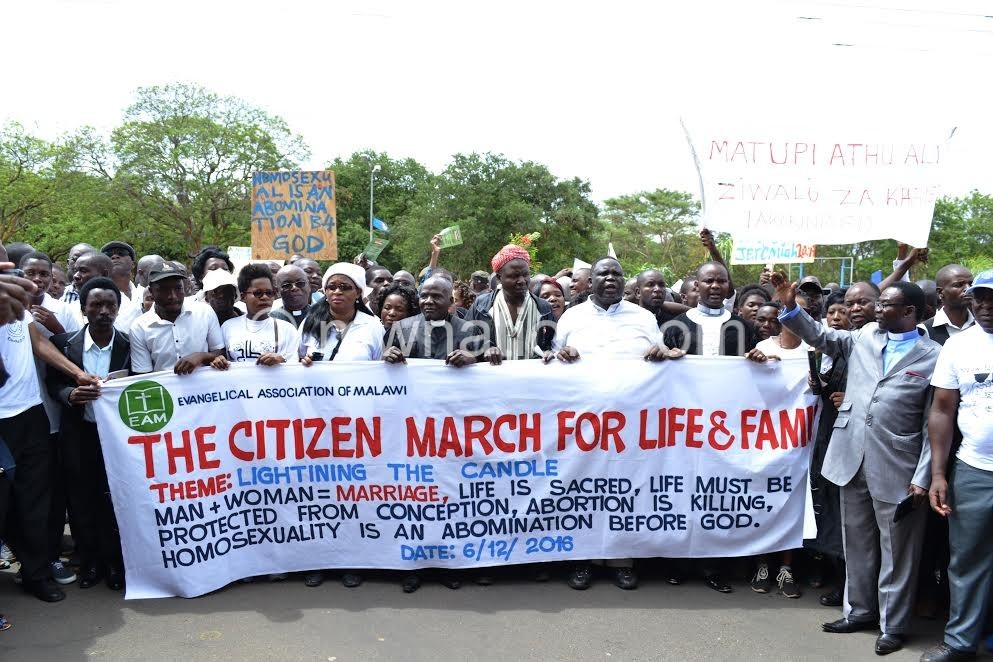Abortion bill stirs confusion
- Govt says ‘Bill’ doesn’t exist
- CSOs, clergy say it is in the pipeline
There is confusion over the status of the alleged proposed Termination of Pregnancy Bill that pushed the faith community to stage nationwide protest marches against the purported Bill yesterday.
In the past months, the issue surrounding the so-called Termination of Pregnancy Bill has raised controversy, with increasing claims that government plans to table the purported Bill in Parliament for debate.
However, while government denies existence of such a Bill, some civil society organisations (CSOs) and the faith community claim to have information that the process on the same was at an advanced stage.
Minister of Information and Communications Technology Malison Ndau, who is also the official government spokesperson, said in a statement yesterday that reports about existence of the Bill were misleading as the process on the issue was yet to be completed.
He said the Law Commission developed a report and made recommendations to government to adopt a new law on abortion.
“The truth of the matter is that the Law Commission has developed a report and made recommendations to government to adopt a new law on abortion… This report is yet to be submitted to Cabinet through the Minister of Justice and Constitutional Affairs for consideration,” reads part of the statement issued yesterday.
Ndau said the Law Commission reports are mere recommendations to government and it is the prerogative of Cabinet to adopt or reject them.
But vice-president of the Coalition for the Prevention of Unsafe Abortions (Copua), Symon Sikwese, said in an interview yesterday the Law Commission has a draft Bill that is supposed to be presented to Parliament upon finalising all the processes.
From the Law Commission, the proposed Bill is supposed to be presented to the Minister of Justice and Constitutional Affairs then to Cabinet for approval to be debated in Parliament.
Said Sikwese: “The draft Bill is there and we are pushing for it to be presented to Parliament.”
But Principal Secretary for Justice and Constitutional Affairs Janet Banda, who is also the Solicitor General, said the Law Commission just made recommendations which have not yet even been presented to her ministry.
She said: “When they make recommendations they do attach a proposed Bill and that is not a government Bill. It is just a recommendation and we don’t consider it as a Bill because when it comes to the Ministry of Justice we sit down and start drafting again according to government instructions.”
She said officially there was no Bill yet and even the Law Commission report has not even reached her desk.
But the Evangelical Association of Malawi (EAM), one of the organisers of yesterday’s nationwide protests alongside the Episcopal Conference of Malawi, said the issue was not just about the draft Bill.
“But as far as we are concerned that Bill is already advanced in the approval processes of government. So our demonstrations were basically against the proposal to change the laws and, as churches, we are saying no to a Bill that will be terminating life, we would rather have Bills that save lives” said EAM general secretary Reverend Francis Mkandawire.
Currently, the status of abortion law is governed by the Penal Code under sections 149, 150, 151 and 243 which prohibit termination of pregnancy except where the life of the mother is threatened.
Timeline of abortion law reforms
Efforts to relax laws restricting termination of pregnancy have plunged the country into a heated debate. As the burning issue rages, safe motherhood activists argue that the law reform will reduce maternal deaths, faith leaders are petitioning hard against proposed amendments of penal laws and government cautiously claims that it has no idea about the Bill that has sparked the fiery counterviews. But as this timeline shows, there is nothing new about the law reform. JAMES CHAVULA gives a blow-by-blow account.
1929: Malawi embraces an 1861 law which allows abortion only to save the life of a pregnant woman.
2000: The review of the Penal Code by the Law Commission retains the provisions dealing with abortion, but recommends that a separate law should be enacted to spell out provisions for legal termination of pregnancies for appropriate reasons.
2005: Malawi ratifies the Protocol to the African Charter on Human and People’s Rights on the Rights of Women in Africa in Maputo, Mozambique. The Maputo Protocol obliges African Union (AU) member States to take all appropriate measures to protect the reproductive rights of women by ensuring medical abortion in cases of sexual assault, rape, incest and where the continued pregnancy endangers the mental and physical health of the mother or the life of the mother and foetus.
2009: Ministry of Health (MoH) conducts a Magnitude and Incidence of Abortion Study which reveals nearly 70 000 women and girls terminate pregnancy every year, with 31 000 of them treated for complications of unsafe abortion. A cost study shows government spends over K300 million treating these complications which result in disabilities, infertility and death of 17 women and girls out of every 200 dying of pregnancy-related conditions.
2011: The Special Law Commission on the Development of the Gender Equality Statute backs its sister commission, observing “the provisions of the Penal Code in respect of abortion are overly restrictive and inconsistent with the spirit of the Reproductive Health Policy as well as international conventions to which Malawi is a party”.
February 2013: The Gender Equality Act is enacted, reiterating the Maputo Protocol stipulations on women’s health and reproductive rights which include the right to control fertility, the right to decide whether to have children and the number and spacing of children and also the right to choose any method of contraception.
June 2013: In line with Section 133 of the Constitution, President Joyce Banda (2012 to 2014) empanels a Special Law Commission to review the law on termination of pregnancy.
June 2015: The Special Law Commission released its report which maintains restrictions on abortion on demand as is the case in Ethiopia.
July 2015: The Law Commission drafts the Termination of Pregnancy Bill as proposed by the special law commissioners.





